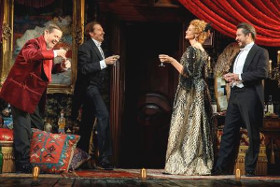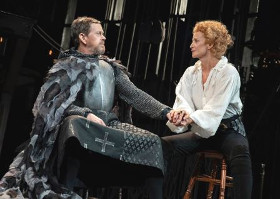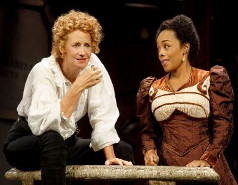
Philip Dorian
| "BERNHARDT/HAMLET" (and McTEER) ON BROADWAY Through November 11 at American Airlines Theatre In 2017, Elizabeth Marvel appeared as Marc Antony in the Free Shakespeare in Central Park "Julius Caesar." In 2018 women are playing Caesar as well as Antony and Cassius at the Stratford Festival in Ontario, where, to boot, Martha Henry is Prospero. These and myriad other cross-gender castings no longer even raise an eyebrow. In 1899, however, Sarah Bernhardt playing Hamlet was "grotesque…a disgusting idea," as a contemporary theater critic declares in Theresa Rebeck's fascinating new historical-fictional play "Bernhardt/Hamlet." The Roundabout Theatre Company production stars Janet McTeer as the actress Oscar Wilde dubbed The Incomparable One, an appellation just as readily suited to Ms. McTeer.
But there's much more to admire. Opening on Sarah reciting the "Oh, what a rogue and peasant slave am I" soliloquy, the first scene captures the essence of the rehearsal process, familiar or instructive depending on one's own experience. Lines are dropped, sequences are interrupted and motivations are questioned. What makes this display so smart – and so funny –is that we're dealing here with, arguably, the greatest play ever written. The theme of Sarah's love/frustration relationship with Shakespeare – and with "Hamlet" in particular – runs through the play. "I have the words," Sarah says when she's cued. "It's the sense of it that eludes," a not uncommon lament of actors and audiences alike. She's particularly vexed by the iambs (ba-BA, ba-BA, ba-BA, as another actor sounds out), an apparent Bernhardt truism, considering that her performed "Hamlet" was a mostly-prose, twelve-scene French adaptation, no less scandalous for a woman at the time. (She was, of course, French.) Sarah sees the confusion over Hamlet's age, arising from his being a college student versus his "I knew him, Horatio" memory of Yorick 23 years after the jester's death, as "another example of how careless Shakespeare is." These and other seeming put-downs are quips, and clever enough, but outweighed by respect and admiration throughout. ("No one has more reverence than I," Sarah says, "for the might of the mighty Shakespeare.")
Bernhardt may or may not have been lovers with Edmond Rostand, as is depicted, but he did write plays for her, including his masterpiece "Cyrano," which Sarah declined. (The shallow Roxanne? Hardly.) Jason Butler Harner is an ideal Edmond, alternately defending and trying to dissuade her. As the actor Constant Coquelin, who, as he reminds us, had played Hamlet four times, Dylan Baker transitions smoothly between Sarah's trusted co-actor and that actor's roles as The Ghost and Polonius.
A rehearsal scene with Hamlet and Ophelia "going at it" is very amusing and, oddly enough, plausible. Ophelia might be "a prop, mostly," according to Sarah, but Brittany Bradford's sensitively played Lysette is much more than a prop. Sarah's compliment to Lysette on her rehearsal strikes an emotional chord that belies the virtually tossed-off remark. Others in the cast are equally effective, including Nick Westrate as Sarah's adult son and Ito Aghayere as a character whom no one else in the play – or the audience – expects to appear. "Why shouldn't I play Hamlet?" Sarah says. "I am perfectly suited. Nobody cares about his masculinity. So called. They care about the magnificent nuance of his heart." Sarah Bernhardt was indeed the first on-record woman to play the Melancholy Dane…in that prose adaptation, but still. "Hamlet is Shakespeare himself," she declares. "It is why every actor hungers after him." Imagining Janet McTeer satisfying her Hamlet hunger with the ba-BA, ba-BA, ba-BA iambs intact is a consummation devoutly to be wished. Mark Twain wrote: "There are five kinds of actresses: bad actresses, fair actresses, good actresses, great actresses. And then there is Sarah Bernhardt." The Divine Sarah died on March 26, 1923 at age 78. Her mammoth funeral procession brought Paris to a standstill. [Dorian] See other NYTW coverage of this show by Lucy Komisar. |
| museums | NYTW mail | recordings | coupons | publications | classified |



